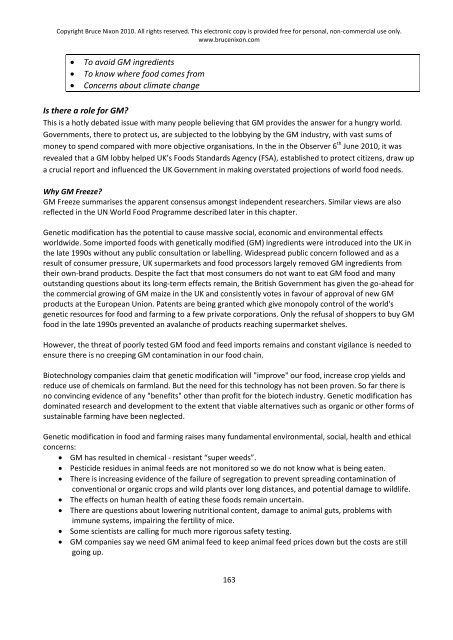A better world is possible - Global Commons Institute
A better world is possible - Global Commons Institute
A better world is possible - Global Commons Institute
You also want an ePaper? Increase the reach of your titles
YUMPU automatically turns print PDFs into web optimized ePapers that Google loves.
Copyright Bruce Nixon 2010. All rights reserved. Th<strong>is</strong> electronic copy <strong>is</strong> provided free for personal, non-commercial use only.<br />
www.brucenixon.com<br />
<br />
<br />
<br />
To avoid GM ingredients<br />
To know where food comes from<br />
Concerns about climate change<br />
Is there a role for GM?<br />
Th<strong>is</strong> <strong>is</strong> a hotly debated <strong>is</strong>sue with many people believing that GM provides the answer for a hungry <strong>world</strong>.<br />
Governments, there to protect us, are subjected to the lobbying by the GM industry, with vast sums of<br />
money to spend compared with more objective organ<strong>is</strong>ations. In the in the Observer 6 th June 2010, it was<br />
revealed that a GM lobby helped UK’s Foods Standards Agency (FSA), establ<strong>is</strong>hed to protect citizens, draw up<br />
a crucial report and influenced the UK Government in making overstated projections of <strong>world</strong> food needs.<br />
Why GM Freeze?<br />
GM Freeze summar<strong>is</strong>es the apparent consensus amongst independent researchers. Similar views are also<br />
reflected in the UN World Food Programme described later in th<strong>is</strong> chapter.<br />
Genetic modification has the potential to cause massive social, economic and environmental effects<br />
<strong>world</strong>wide. Some imported foods with genetically modified (GM) ingredients were introduced into the UK in<br />
the late 1990s without any public consultation or labelling. Widespread public concern followed and as a<br />
result of consumer pressure, UK supermarkets and food processors largely removed GM ingredients from<br />
their own-brand products. Despite the fact that most consumers do not want to eat GM food and many<br />
outstanding questions about its long-term effects remain, the Brit<strong>is</strong>h Government has given the go-ahead for<br />
the commercial growing of GM maize in the UK and cons<strong>is</strong>tently votes in favour of approval of new GM<br />
products at the European Union. Patents are being granted which give monopoly control of the <strong>world</strong>'s<br />
genetic resources for food and farming to a few private corporations. Only the refusal of shoppers to buy GM<br />
food in the late 1990s prevented an avalanche of products reaching supermarket shelves.<br />
However, the threat of poorly tested GM food and feed imports remains and constant vigilance <strong>is</strong> needed to<br />
ensure there <strong>is</strong> no creeping GM contamination in our food chain.<br />
Biotechnology companies claim that genetic modification will "improve" our food, increase crop yields and<br />
reduce use of chemicals on farmland. But the need for th<strong>is</strong> technology has not been proven. So far there <strong>is</strong><br />
no convincing evidence of any "benefits" other than profit for the biotech industry. Genetic modification has<br />
dominated research and development to the extent that viable alternatives such as organic or other forms of<br />
sustainable farming have been neglected.<br />
Genetic modification in food and farming ra<strong>is</strong>es many fundamental environmental, social, health and ethical<br />
concerns:<br />
GM has resulted in chemical - res<strong>is</strong>tant “super weeds”.<br />
Pesticide residues in animal feeds are not monitored so we do not know what <strong>is</strong> being eaten.<br />
There <strong>is</strong> increasing evidence of the failure of segregation to prevent spreading contamination of<br />
conventional or organic crops and wild plants over long d<strong>is</strong>tances, and potential damage to wildlife.<br />
The effects on human health of eating these foods remain uncertain.<br />
There are questions about lowering nutritional content, damage to animal guts, problems with<br />
immune systems, impairing the fertility of mice.<br />
Some scient<strong>is</strong>ts are calling for much more rigorous safety testing.<br />
GM companies say we need GM animal feed to keep animal feed prices down but the costs are still<br />
going up.<br />
163
















